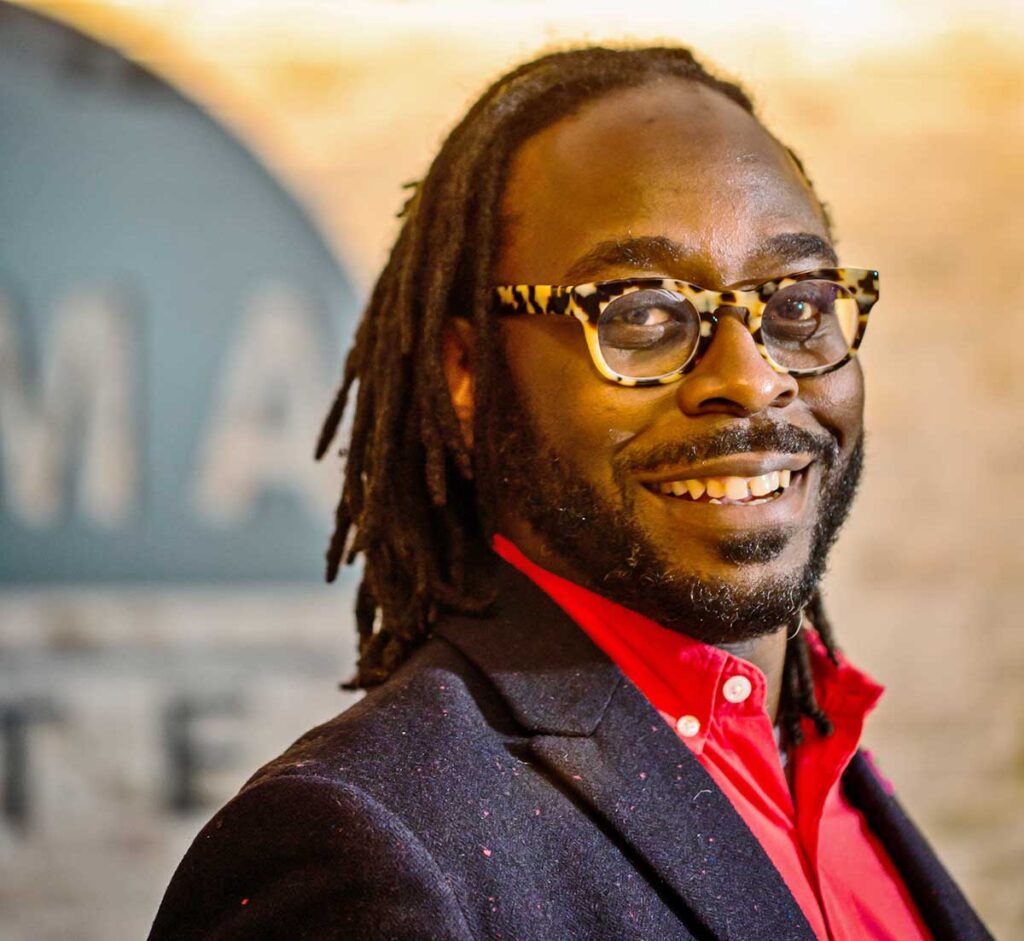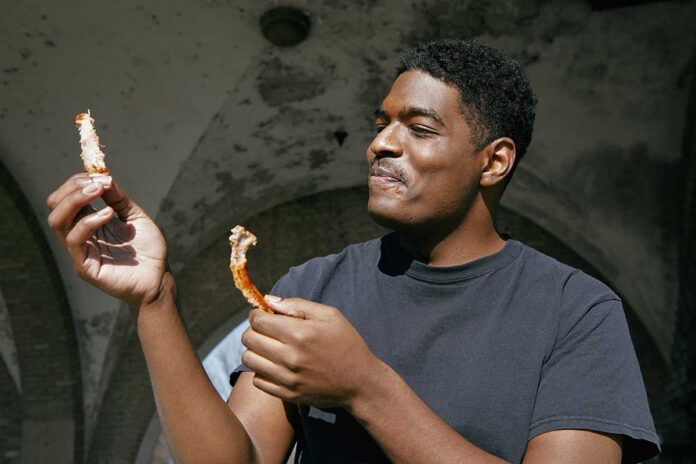In February 2020, the Wilma Theater announced a leadership transition that involved Blanka Zizka, the company’s longtime artist director, sharing her duties with three new collaborative partners, including James Ijames. The prolific out artist has made his mark in Philadelphia theater as an actor, playwright and director over the past 15 years, winning five Barrymore Awards and co-founding the much-admired playwrights’ collective Orbiter 3. Along with Zizka and co-artistic directors Morgan Green and Yury Urnov, Ijames was ready to hit the ground running and begin writing the Wilma’s next chapter.
Then the pandemic hit, indefinitely closing the company’s performance space on South Broad Street. But creativity didn’t stop. On April 29, the Wilma will debut the streaming premiere of Ijames’ “Fat Ham,” a Black, queer, southern spin on “Hamlet.” The production, directed by Green, was shot on location in rural Virginia, and features several members of the HotHouse, the Wilma’s resident acting company. Ijames is also preparing to assume the role of Lead Artistic Director for the company’s 2021-2022 season. He spoke with PGN about the transition to streaming theater, how he approaches Shakespeare and what keeps him rooted in Philadelphia.

You were named as one of the new co-artistic directors of the Wilma in February 2020, about a month before theaters shut down. What are some of the ways you’ve been thinking about how this situation allows for reimagining what theater can be?
I feel like there is a rarefication that comes with spaces in theater. With plays on Broadway, or in a LORT [League of Regional Theaters] theater, there is a rarefication of place that is irrelevant in a world where you can’t go anywhere. So there’s something that happened to our understanding of what theater is — that it’s people, and it’s the art that people make together — that has changed our relationship to these spaces. I’m wondering what that means when we start to come back. I’m wondering what that means about access. Who is close to the space usually drives what happens inside the space, and I’m wondering if the audience is bigger, how will that change what the people inside of the space do? I think the structure of having four artistic directors has been really good for us, because you have four people thinking about what’s possible instead of just one in the midst of catastrophe. Because if you get down to what things felt like in April 2020, it felt like catastrophe. It doesn’t feel like that anymore. I think theater is going to come back stronger and be more caring. It’s going to take care of the artist more, and there’s going to be a more inclusive lens on who we hire to work in the theater. We want to make sure that as many people as possible have access to theater. I’m hoping the ability to stream and share things far and wide finds a place in the future, because it’s not a thing that theater has really allowed for.
“Fat Ham” is inspired by “Hamlet.” How would you describe your relationship to Shakespeare?
My relationship is fraught. I went to a historically Black college, and we certainly learned about Shakespeare and the Greeks, but it wasn’t the pre-eminent work that we aspired to. I went to college wanting to be Pearl Cleage, wanting to be August Wilson, and I discovered Suzan-Lori Parks — these were the writers I felt were speaking to me, and all three have had a huge impact on me as a writer. It wasn’t until grad school that I was in a position where I had to approach Shakespeare as if it was the pinnacle of what an artist should be aspiring to, whether you’re an actor, director or designer. I remember one time someone told me, “You want to be really good at Shakespeare because that’s going to be the majority of your work when you get out.” I’ve done one professional Shakespeare production in my life — “Romeo and Juliet” at the Arden — and it was absolutely lovely, but my life and career have been rich and wonderful with or without Shakespeare.
How did you set about envisioning “Hamlet” from a Black, southern and queer perspective?
I’ve always had a real appreciation for “Hamlet.” At its core, in my mind, it’s about a fraught relationship between one generation and the next. I was very much feeling that in my coming out experience, where all these things in my life were shifting. And Hamlet’s mad sulking… well, I thought it was kind of sexy, even. [Laughs.] I was taken by the soapy, intriguing elements of the play, which is not at all how most people treat it. It’s treated like the pinnacle of performance, and I think of it as this really delicious family drama. Some of the earliest plays I encountered were Tyler Perry plays — I know, for some people, that’s like He Who Shall Not Be Named — and in many ways, I learned about theatrical forms from watching those liturgical plays. They also had a big impact on me. “Hamlet,” if you change a few things, sits in the container of a domestic drama about a family, with big sociopolitical problems bearing down on this family. And that’s right in line with so many contemporary writers.
This production is being filmed as one continuous take. Was that chosen to give off a more theatrical style?
The idea comes from Morgan Green, the director. She wanted it to feel as live as possible, so we talked about it in a couple different ways. We thought about embedding cameras in different parts of the set, so that it would stream live and people could watch it in real time, and ultimately we realized we couldn’t sustain that level of technology. Morgan really wanted to keep a sense of real time, and moving from space to space, and I thought that was really exciting. One thing I like about that is that it’s not how you would experience the play in a theater — no one is curating where your eye needs to go. I like that the action is following Juicy [the central character], the person who is in clear relation with the camera, and we’re seeing things from his point of view. I think the play thrives on having an audience, and this could elicit that.
You’re not from Philadelphia, but you’ve put down roots here and become one of the most recognizable figures on the local theater scene. What’s kept you here?
I moved here in 2006 to go to grad school with no intention of staying. I moved here in many ways because it’s so close to New York City, and I thought when I was done it wouldn’t be a huge leap to New York. I found my closest friendships of my life here. I fell in love here. In many ways, my family — outside of my own family, who I’m extremely close to — are all here. That’s the first thing that made me stay. For some reason, I’m an artist who’s always picked where I wanted to be based on where I wanted to live, not on what that place could do for me career-wise. I felt that if my quality of life was good, I could make anything work. I just knew I wanted to find a place that I really loved, and that I felt really loved me. I like Philly, and it’s beyond the theater community. I like the way it looks, I like the way it smells. I like food, I like the people. I don’t even watch sports, but I love the sports culture in Philly. When everything happened with the election, and Philly was one of the last places to make the determination of what the next 4 years would look like, I was really excited by that. I love this place!
“Fat Ham” streams March 25 through April 10. For more information and to purchase tickets, visit www.wilmatheater.org/event/fat-ham/.
